|
|
| |
|
| |

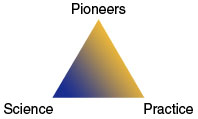
SpringerBriefs on
Pioneers in Science and Practice (PSP)
Edited by
Hans Günter Brauch
Free University of Berlin and AFES-PRESS
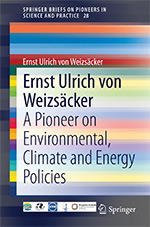 |
Ernst Ulrich von Weizsäcker: Ernst Ulrich von Weizsäcker: A Pioneer on Environmental, Climate and Energy Policy – Presented by Uwe Schneidewind. SpringerBriefs on Pioneers in Science and Practice No. 28 (Cham – Heidelberg – New York – Dordrecht – London: Springer-Verlag, 2014).
ISBN (Print) 978-3-319-03670-0
ISBN (Online/eBook): 978-3-642
DOI: 10.1007/978-3-642-
Order Form
Order this book on the Springer Website
Order electronic version and individual chapters
|
| |
|
- This anthology covers a unique range of courageously formulated subjects by a single author
- His university proposal of 1972 suggested modularized curricula - partly preempting the Bologna reforms and emphasizing interdisciplinary studies and qualifications
- The "Factor Five" concept is one of the boldest ideas to date for avoiding dangerous climate change
On the occasion of the 75th birthday of Ernst Ulrich von Weizsäcker this unique anthology presents thought-provoking texts from 1970 to 2014, spanning several disciplines and combining science and practice. Among them are three Reports to the Club of Rome that Weizsäcker lead-authored, a new university curriculum system to promote interdisciplinary studies and a proposal for a five-fold increase in resource productivity, which would make it possible to shut down nuclear and fossil power plants, avoiding dangerous climate change impacts. Weizsäcker is Co-President of the Club of Rome and Co-Chair of UNEP’s Resource Panel. He has served as a Professor of Biology, President of Kassel Univ., Director of the UN Centre for Science and Technology and of the Institute for European Environment Policy, President of the Wuppertal Institute for Climate, Environment and Energy, as a Member of the Bundestag, as Chair of its Environment Committee, and as Dean of the Bren School for Environmental Science and Management, Univ. of California, Santa Barbara, USA.
Content Level » Research
Keywords » Climate, Environment and Energy Policy - Club of Rome - Factor Four and Five - Reform of University Curricula - UNEP Panel on Sustainable Resource Management
Related subjects » Climate Change Impact - Environmental Management - Policy, Economics, Management & Transport
Table of contents
Foreword by Uwe Schneidewind –Autobiographical Sketch.- Ernst Ulrich von Weizsäcker’s Publications- Modular University (1971 - Contagious Knowledge: Contagion as a Quality Criterion for Disciplinary and Interdisciplinary Science (1983) - Editorial Note on “Integrated Application of Emerging and Traditional Technologies for Development” (1983) - The Environmental Dimension of Biotechnology (1986) - Not a Miracle Solution but Steps towards an Ecological Reform of the Common Agricultural Policy (1987)- Earth Politics (selected pages, 1992) - (with Jochen Jesinghaus): Ecological Tax Reform (selected pages, 1992) - Sustainable Energy Policies: Political Engineering of a Long Lasting Consensus (1993) - Sustainable Energy Policies: Political Engineering of a Long Lasting Consensus (1993) - Factor Four: Doubling Wealth - Halving Resource Use (selected pages, 1997) - Eco-Efficiency Goals: Factor Four or Factor Ten (1997) - Sharing the Planet: From “Limits to Growth” to “Factor Four” (2002) - Globalization and its Challenges to Democracy and Development (2003) - (with Oran Young and Matthias Finger): Limits to Privatization (selected pages, 2005) - (with Christine von Weizsäcker): Information, Evolution, and ‘Error-Friendliness’ (2006) - Factor Five (selected pages, 2009) - Climate Sceptics Keep a Distance from Solutions (2012) - Decoupling: Technological Opportunities and Policy Options , Executive Summary (selected pages, 2014) .
Biographical Data on Ernst Ulrich von Weizsäcker
Videos in German with Ernst Ulrich von Weizsäcker
|
About the Author
|
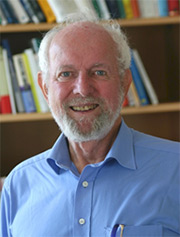 |
Ernst Ulrich von Weizsäcker was born on 25 June 1939 in Zürich, Switzerland. In 1965 he obtained a M.A. in Physics from Hamburg university and in 1969 a Ph.D. in Biology from Freiburg University, Germany. In 1972 he became Professor of Biology at Essen University, and in 1975 he became Founding President, University of Kassel. He was director, UN Centre for Science and Technology for Development, New York (1981-1984), Director, Institute for European Environmental Policy, Bonn, London, Paris (1984-19921), and in 1991 he became Founding President, Wuppertal Institute for Climate, Environment, Energy.
In 1998 he was elected as a Member of Parliament, SPD (serving as Chair, consecutively, of the Bundestag Study Commission on Economic Globalization, and of the Environment Committee).
In 2006 he became Dean, Bren School for Environmental Science and Management, UC Santa Barbara, California. 2007-2009 Co-Chair China Council (CCICED), Task Force on Economic Instruments for Energy Efficiency and the Environment. 2009 retired; pro bono Co-Chair, since 2007, International Resource Panel, and Co-President, since 2012, of the Club of Rome.
English language publications: (with Jochen Jesinghaus): Ecological Tax Reform:(London: Zed Books, 1992); Earth Politics (London: Zed Books, 1994); (with Amory and Hunter Lovins): Factor Four. Doubling Wealth — Halving Resource Use (London: Earthscan,, 1997); (with Oran Young and Matthias Finger): Limits to Privatization (London, Earthscan, 2005); (with Charlie Hargroves et al.): Factor Five (London, Earthscan, 2009). The last three books are also available in Chinese.
Awards: 1989: Premio de Natura; 1996: Duke of Edinburgh Gold Medal of WWF Inter-national; 2001: Takeda Award, shared with. F. Schmidt-Bleek; 2008: German Environment Prize; 2010: Federal High Cross of Merit; 2011: Theodor Heuss Prize; 2012: Medal of Merit, Baden Württemberg.
Homepage
Address: P.O.Box 1547, 79305 Emmendingen, Germany;
Email: ernst@weizsaecker.de.
Photo was taken by James Badham in Santa Barbara, California (USA) who transferred the copyright to the author. |
| |
|
About the Coauthors
Jacqueline Aloisi de Larderel (France), former Director of UNEP’s Department of Technology, Industry and Environment (DTIE) in Paris, is a member of the International Resource Panel of UNEP.
Cheryl Desha (Australia) is a member of The Natural Edge Programme (TNEP)
Dr. Matthias Finger (Switzerland), is professor of political sciences at the Swiss Federal Institute of Technology, Lausanne
Karlson ‘Charlie’ Hargroves (Australia) is founder and leader of The Natural Edge Programme (TNEP) and a member of the Club of Rome.
Dr. Jochen Jesinghaus (Germany), former researcher at the Wuppertal Institute for Climate, Environment and energy, he was a statistician working for Eurostat and is now civil servant, European Ccommission, European Research Institute, Italy
Dr. Irene Kehler (Germany) was a fellow in 1972 of the Heidelberg based group on empirical educational research
Prof. Amory Lovins (USA) is the great pioneer of energy efficiency. He serves as Director of Research at the Rocky Mountain Institute, Snowmass, Colorado.
Dr. Aklilu Lemma (Ethiopia) was Senior Fellow at the UN Centre for Science and Technology for Development, and a member of the Club of Rome.
L. Hunter Lovins (American), weas at the time of writing Factor Four founder and President of Natural Capitalism Solutions, Longmont, Colorado; she is a member of the Club of Rome.
Dr. Michael H. Smith (Australia) is a member of The Natural Edge Programme (TNEP)
Peter Stasinopoulos (Australia) is a member of The Natural Edge Programme (TNEP)
Prof. M.S. Swaminathan (India), is an eminent researcher into agricultural innovation; he served as the Chairman of the United Nations Advisory Committee on Science and Technology for Development.
Dr. Christine von Weizsäcker (Germany), a biologist by traning is president, Ecoropa, an environmental NGO, and wife of Ernst Ulrich von Weizsäcker. She coined the term Fehlerfreundlichkeit (error-friendliness).
Dr. Oran Young (USA), is professor emeritus of social sciences at the Bren School for Environmental Science and Management, University of California, Santa Barbara.
|
| |
|
Books by Ernst Ulrich von Weizsäcker in English |
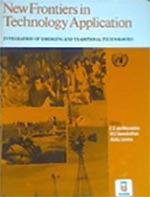 |
(Co-editor with Swaminathan, M.S.;
Lemma, Aklilu, and co-author):
New Frontiers in Technology Application.
Integration of Emerging and Traditional Technologies
(Dublin: Tycooly International, 1984). |
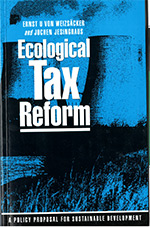 |
(Co-author with Jesinghaus, Jochen):
Ecological Tax Reform.
A Policy Proposal for Sustainable Development
(London – Atlantic Highlands, NJ: Zed Books, 1992). |
| |
|
|
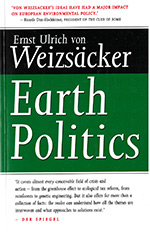 |
Earth Politics
(London: Zed, 1994).
|
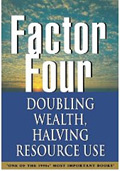 |
(Co-author with Lovins, Amory; Lovins, Hunter):
Factor Four.
Doubling Wealth, Halving Resource Use
(London, Earthscan. 1997). |
| |
|
|
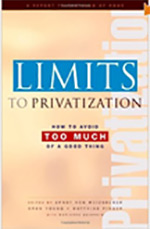 |
(co-author and lead editor, with Young, Oran; Finger, Matthias):
Limits to Privatization.
How to avoid too much of a good thing
(London: Earthscan). |
 |
(With Hargroves, Charlie; Smith, Michael):
Factor Five. Transforming the Global Economy
through 80 % Improvements in Resource Productivity
(London: Earthscan). |
| |
|
|
Books by Ernst Ulrich von Weizsäcker in German |
|
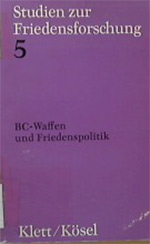 |
Editor and co-author):
BC-Waffen und Friedenspolitik
(Stuttgart: Klett, 1970). |
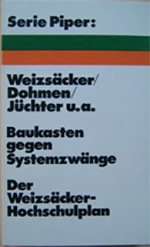 |
(Editor, with others, and lead author):
Baukasten gegen Systemzwänge.
Der Weizsäcker-Hochschulplan
[Academic Building Blocks Against Curricular Straight Jackets.
The Weizsäcker University Plan]
(Munich: Piper, 1971). |
| |
|
|
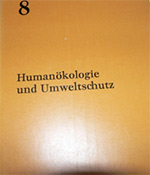 |
(Editor and co-author):
Humanökologie und Umweltschutz
(Stuttgart: Klett, 1972). |
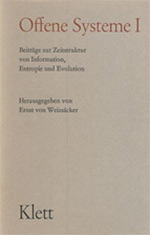 |
(Editor and co-author):
Offene Systeme I.
Beiträge zur Zeitstruktur von Information,
Entropie und Evolution
(Stuttgart: Klett, 1974; 2nd ed., 1986. |
| |
|
|
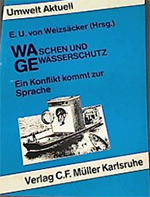 |
Editor and co-author):
Waschen und Gewässerschutz.
Ein Konflikt kommt zur Sprache.
(Karlsruhe: Müller, 1986). |
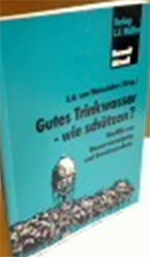 |
(Editor and co-author):
Gutes Trinkwasser, wie schützen?
Konflikt um Wasserversorgung und Gewässerschutz
(Karlsruhe: Müller, 1988). |
| |
|
|
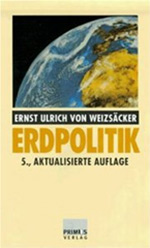 |
Erdpolitik.
Ökologische Realpolitik an der
Schwelle zum Jahrhundert der Umwelt.
(Darmstadt: Wissenschaftliche Buchgesellschaft, 1989). |
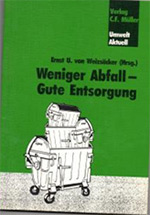 |
Editor and co-author):
Weniger Abfall – gute Entsorgung.
Konflikte um den Hausmüll
(Karlsruhe: Müller, 1991). |
| |
|
|
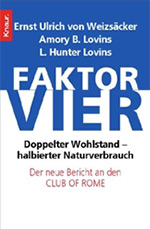 |
Co-author with Lovins, Amory; Lovins, Hunter).
Faktor Vier.
Doppelter Wohlstand,
halbierter Naturverbrauch
(Munich: Droemer Knaur, 1995). |
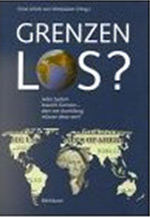 |
Editor and co-author):
Grenzen-Los?
Jedes System braucht Grenzen –
aber wie durchlässig müssen diese sein?
(Basel – Boston – Berlin: Birkhäuser, 1997). |
| |
|
|
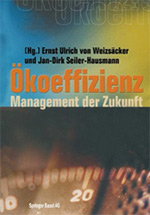 |
(coeditor with Jan-Dirk Seiler-Hausmann):
Ökoeffizienz:
Management der Zukunft
(Wuppertal Texte)
(Basel: Birkhäuser, 1999). |
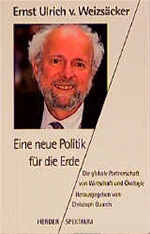 |
(co-author with Quarch, Christoph):
Eine neue Politik für die Erde.
Die globale Partnerschaft von Wirtschaft und Ökologie
(Freiburg: Herder, 1999). |
| |
|
|
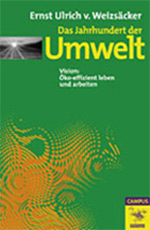 |
(Editor and co-author):
Das Jahrhundert der Umwelt
(Frankfurt – New York: Campus, 1999). |
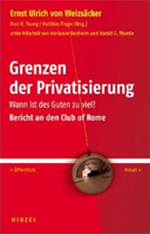 |
Grenzen der Privatisierung.
Wann ist des Guten zuviel?
(Stuttgart: Hirzel Verlag, 2006). |
| |
|
|
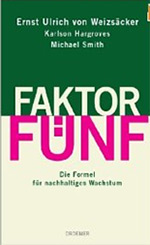 |
(co-author with Karlson Hargroves
and Michael Smith):
Faktor 5.
Die Formel für nachhaltiges Wachstum
(Munich: Droemer-Knaur. 2010). |
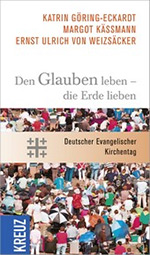 |
(with Margot Käßmann, Katrin Göring-Eckard):
Den Glauben leben - die Erde lieben
(Freiburg: Herder, 2011). |
| |
|
|
Books by Ernst Ulrich von Weizsäcker in other Languages |
|
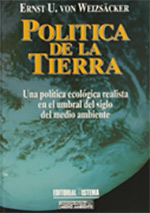 |
Erdpolitik was translated into
Spanish
(picture on the left),
English (Earth Politics),
and Korean. |
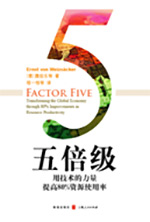 |
Limits to Privatization was translated
into German and
Chinese. |
| |
|
|
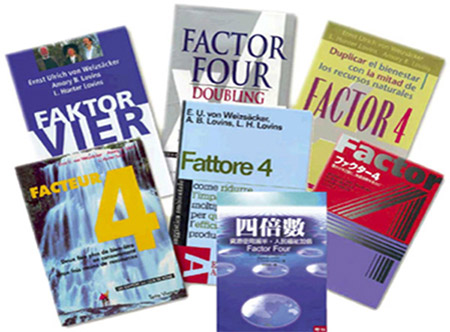 |
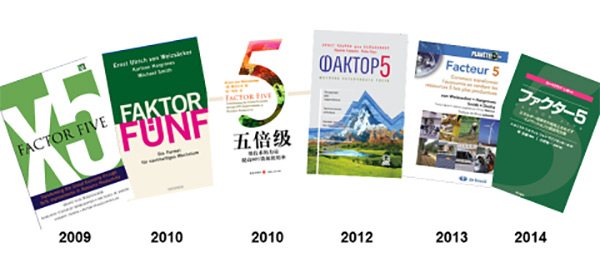 |
| Factor Four was translated into German, Czech, Spanish, Japanese, Russian,
French, Italian, Chinese (first Taiwan, complex characters, later mainland,
simplified haracters), Hungarian, Polish; also a Persian translation exists
but was never published. |
Factor Five was translated into German, Chinese, Russian, French, Japanese,
and Portuguese |
| |
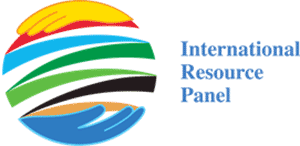
The International Resource Panel was established by the United Nations Environment Programme (UNEP) in 2007 to provide independent, coherent and authoritative scientific assessment on the sustainable use of natural resources and the environmental impacts of resource use over the full life cycle. By providing up-to-date information and best science available, the International Resource Panel contributes to a better understanding of how to decouple human development and economic growth from environmental degradation. The information contained in the International Resource Panel’s reports is intended to be policy relevant and support policy framing, policy and programme planning, and enable evaluation and monitoring of policy effectiveness.
In addition to UNEP, members and partners of the International Resource Panel are twenty countries, including the USA, China and Russia, as well as the EU and several international organizations. The two Co-Chairs of the Panel are Dr. Ashok Khosla, founder of Development Alternatives, India, and Ernst Ulrich von Weizsäcker.
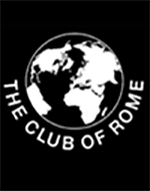
The Club of Rome was founded in 1968 as an informal association of independent leading personalities from politics, business and science, men and women who are long-term thinkers interested in contributing in a systemic interdisciplinary and holistic manner to a better world. The Club of Rome members share a common concern for the future of humanity and the planet.
The Club of Rome is a non-profit organisation, independent of any political, ideological or religious interests. Its essential mission is “to act as a global catalyst for change through the identification and analysis of the crucial problems facing humanity and the communication of such problems to the most important public and private decision makers as well as to the general public.” Its activities should: “adopt a global perspective with awareness of the increasing interdependence of nations. They should, through holistic thinking, achieve a deeper understanding of the complexity of contemporary problems and adopt a trans-disciplinary and long-term perspective focusing on the choices and policies determining the destiny of future generations.” The aims of the Club of Rome are: to identify the most crucial problems which will determine the future of humanity through integrated and forward-looking analysis; to evaluate alternative scenarios for the future and to assess risks, choices and opportunities; to develop and propose practical solutions to the challenges identified; to communicate the new insights and knowledge derived from this analysis to decision-makers in the public and private sectors and also to the general public and to stimulate public debate and effective action to improve the prospects for the future.
At present the Club has two Co-Presidents, Dr. Anders Wijkman (Sweden) and Ernst Ulrich von Weizsäcker (Germany), and two Vice-Presidents, Dr. Roberto Peccei (USA/Italy) and Dr. Sheila Murray (Canada). The work of the International Club is supported by a small International Centre in Winterthur, Switzerland former Worldbank Vicepresident Ian Johnson (UK) serving as Secretary General.

The Federation of German Scientists (FGS; German acronym VDW) was founded in 1959 by renowned nuclear scientists, including Carl Friedrich von Weizsäcker and the Nobel Prize laureates Max Born, Otto Hahn, Werner Heisenberg, and Max von Laue. The members of FGS stand in their tradition of feeling committed to look at the possible military, political, economic and social implications of science. FGS' membership lists also include representatives of the humanities and social sciences, so that a large range of topics is approached at a high level of competence. With the results of its interdisciplinary work the Federation of German Scientists not only addresses the general public, but also the decision-makers at all levels of politics and society. Throughout his career, Ernst Ulrich von Weizsäcker has been closely affiliated with the VDW, as a member of its board (1985-1991, 2003-2009), as its chairman (1988-1991) and as a member of the VDW’s Advisory Committee (2009-2015).


Wuppertal Institute for Climate, Environment and Energy
The Wuppertal Institute was founded in 1991 by Johannes Rau, the then prime minister of the Land North Rhine-Westphalia. With the end of the Cold War and German reunification decision makers shifted their emphasis more to global problems including global warming. The Wuppertal Institute was one of the first think tanks, under its founding president, Ernst Ulrich von Weizsäcker to look at the societal and economic dimensions of climate change. In 2000, he was succeeded by Professor Peter Hennicke and later by Professor Uwe Schneidewind. Meanwhile the team had grown to 240 scientists and support staff. Research focus are the transition processes towards sustainable development. This requires an integrated, trans-disciplinary approach to policy and science because many of the issues it raises cannot be addressed within a single department or using the tools of individual scientific disciplines. Therefore the four research groups work on:
-
Future Energy and Mobility Structures
-
Energy, Transport and Climate Policy
-
Material Flows and Resource Management
-
Sustainable Production and Consumption
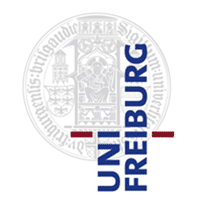
Mission Statement of the Albert-Ludwigs-Universität Freiburg i.Br.
Founded in 1457, the University of Freiburg is one of the oldest German universities and is now one of the nation’s leading research and teaching institutions. The University of Freiburg is consciously aware of its intellectual roots in the occidental Christian tradition, especially in the humanism of the Upper Rhine. Building on the original disciplines of theology, law, medicine, and philosophy, it cherishes its mission of passing on the classical cultural heritage to new generations and continuing the southern German liberal tradition. At the same time, the university is dedicated to defining and pioneering new research areas and promoting a strategic interweaving of the natural and social sciences with the humanities.
It is evident and internationally recognized that the University of Freiburg is pursuing a consistent policy to set up cross-disciplinary networks at all levels. In the area of teaching, this involves an above-average proportion of interdisciplinary modules and a consistently cross-disciplinary orientation of the courses at the Master’s level. Where research is concerned, this notion manifests itself in the founding of interdisciplinary centers and above-all in the founding of the Faculty of Applied Sciences, which makes the University of Freiburg the only classical university to combine traditional disciplines with the entire spectrum of microsystems technologies.
Prof. Dr. Ernst Ulrich von Weizsäcker obtained his PhD. In biology from the University of Freiburg in 1970 and since 2012 was appointed Honorary Professor teaching international environmental and climate policies.
|
 |
 |
|
|
|